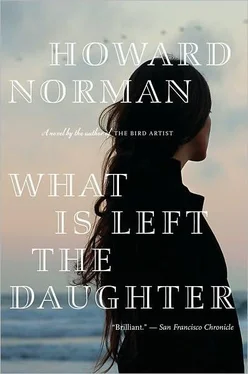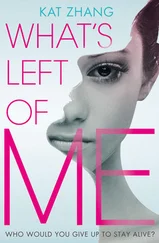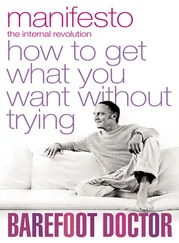"All right, Tilda," I said. "Ask your question."
"Did you know that my father left broken pieces of all his gramophone records on our bed? Right upstairs from where we're sitting now. My own father trespassed in like a burglar or something. It had to be my dad. Nobody else would dare touch those records. Honestly, now, did you know he did that? Were you aware of it? Why would Pop do that? Because it was the most upsetting thing. Hans fixed an inside lock to the door of our rooms, can you imagine?"
"Aunt Constance and me couldn't find the records, Tilda," I said. "But I didn't know what happened to them. And that's God's truth."
"I believe you, Wyatt."
"I know Aunt Constance's been to see you."
"A number of times," Tilda said. "She didn't ask me to move back home. She said she's worried about Dad in all sorts of regards. You know what? Mom asked Cornelia, did my living out of wedlock with Hans above her bakery make her uncomfortable?"
"What'd Cornelia say to that?"
"She said, 'Constance, I lived with my husband Llewyn, rest in peace, two years before we got married. I'm no hypocrite.'"
"Sounds like Cornelia, all right," I said.
"Out of wedlock or no," Tilda said, "I'm getting sick of her sandwiches."
"Yesterday we had stew from the French cookbook," I said. "It was just me and Aunt Constance at table, though. Uncle Donald's appetite, what's left of it, hasn't been kicking in till later in the evening, you might say."
"Well, I'm not going home for supper, Wyatt," Tilda said. "But I am wanting to confide in you, because you're the most dignified man I know. Though not so dignified of late, eh?"
"I wouldn't call me dignified of late, no."
"Can I show you something?"
"All right."
Tilda reached into her Dutch school bag and took out a sheaf of papers held together by a paper clip. She set them in front of me and said, "I wrote this. Well, Hans talked to me and I took dictation. I'm hardly as capable as Lenore Teachout, but I did a pretty good job."
"What is it, anyway?"
"It's Hans's obituary. He provided a lot of facts, and I added some flourishes, you might say. Hans has the original, and he's writing one in German, too. For his parents."
"This kind of gives me the creeps, Tilda," I said. "Why'd Hans want you to write his obituary? He's only twenty years old."
"Twenty-one," Tilda said. "As to your question, maybe the best way to put it is, Hans doesn't take life for granted. Not like many people take it for granted. That's the big lesson out of history he's learned. Don't take any single day for granted. At any rate, it's how he thinks. And it's a way of thinking he's earned, believe me. You read this obituary, you'll understand. He said I could just keep adding to it after we'd set up house and such together, eh? As the years go by."
"Maybe I'll get a coffee now." I poured a cup of coffee from the pot on the electric ring behind the counter and sat down across from Tilda again.
"Wyatt," Tilda said, "I need to ask you a favor."
"Favors aren't easy for you to ask," I said. "That much I still know about you."
"I'd like you to show this obituary to my father."
"Why on earth?"
"Because the U-boats, the radio and everything else have got him halfway off his rocker, that's why," she said. "You're in the house, Wyatt. Don't act like you don't know exactly what I mean. And if Hans Mohring— if. If Hans should become my husband, then Dad's got to try and see him whole-cloth. I think the obituary might help Dad see Hans as someone who's not had an easy time of it. And that he loves me and I love him. Maybe we're both a bit head-over-heels. But so what? Maybe it's laughable, us all smitten. But it's not laughable to us. Anyway, my hope is, this obituary, in his daughter's handwriting, might help convince my dad that Hans is not just a German anybody. Understand, Wyatt?"
"You look like you're going to cry, Tilda," I said. "It's too early in the morning to get so worked up."
"Well, I started getting worked up about eight o'clock last night," she said. "I've been getting steadily more worked up ever since. Just please give this obituary to my father, will you?"
Marlais, I did deliver those pages to my uncle out in his shed, and he did read them, and then he tacked them to the wall along with the newspaper articles. He placed the obituary next in line after the last reported U-boat sinking. Then he went back to applying linseed to a sled. He didn't offer a single comment about Hans Mohring's life. What my uncle did say was "This is one inspiring document Tilda's written up, don't you think?" Later, I sneaked into the shed on my own and retrieved the obituary.
Those pages, in Tilda's own hand, I've kept all these years.
Always Leave a Little Room for a New Purchase
NEXT MORNING, OCTOBER 6, I didn't bother to go to work. Instead, at seven A.M. I went to the bakery, and there sat Tilda again. She looked all haywire, exhausted as I'd ever seen her, I'd say more ravished, just this once, than ravishing. She wore a gray fisherman's sweater, dark loose trousers and galoshes. It was steadily raining, with harder rain in the offing. The moment I joined her at the window-side table she said, "Hans has made an addition to his obituary."
Cornelia was behind the counter. On its shelf, the radio was affected by the storm. There was mostly static, with barely audible passages of music now and then. Yet Cornelia made no effort to find another station. I hoped that I was wrong, but it was almost as if she was resigned to the static itself being the featured program, human expression the interruption. Tilda and I watched her a few moments.
"Being a touch stingy with candy sprinkles on those cupcakes, aren't you, Cornelia?" Tilda said. Cornelia ignored this. Every day after school, children stopped in for cupcakes. One to eat in the bakery, sometimes up to half a dozen to take home. Cornelia couldn't afford to slack off on them. The woodstove had only just begun to provide heat. Tilda and I were drinking coffee and eating toast and jam. "Want to know what he added?" Tilda said.
"I'm all ears."
"That he is survived by his wife, Tilda Hillyer, of Middle Economy, Nova Scotia."
We sat without talking for a few minutes. "Wyatt, I'll need you to give me away at my wedding," Tilda said then. "Considering recent events. Considering everything. I can't ask my father, now, can I? He'd refuse me."
"Tilda, have you just told me you've set a wedding date?"
"October tenth," she said.
"That's just four days from now."
"Coming up quick, I know. Reverend Plumly over in Advocate Harbor agreed to perform the rites. I thought five or so villages down the road wasn't too close or too far. When I told him Hans is a German citizen, all Reverend Plumly said was 'I won't charge additional money for that.'"
"Reverend Witt turn you down?"
"I try not to go where I know I'm going to get my feelings hurt," Tilda said. "No, I didn't approach him."
"I take it you've told Aunt Constance."
"Hans made the announcement in private to Mother, on her last visit, which was two mornings back. He asked her for my hand in marriage. Mother hugged us both, but then, she would, wouldn't she? No matter what she thought."
"I wonder if she's told Uncle Donald."
"Probably she's got to decide, would the news be worse for Dad now or later?"
"Promise me you'll never tell me how Hans proposed marriage," I said.
"He said he felt like he'd known me his whole life already, so why not continue that."
"Funny, since you've never been to Germany."
"You know how he meant it, Wyatt."
"Did Hans get that letter off to his professor?"
"Went out in yesterday's post."
Tilda looked out the window at the Minas Basin. Fairly close to shore, the usual cormorants barely preceded their wing-flapping shadows, low to the water. "I wish cormorants never got on Noah's Ark," she said. "I've always despised that ugly bird." No matter what the subject, no matter how glum the circumstances, Tilda never failed to make me laugh. "But they've got God's equal rights to the sea, I suppose."
Читать дальше












